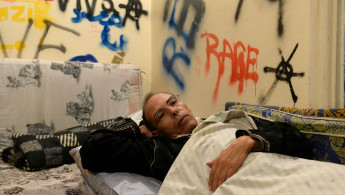Moroccan activist ends hunger strike as travel ban lifted
Maati Monjib, announced Thursday he had ended a three-week hunger strike after the judiciary lifted a travel ban against him.
A prominent Moroccan academic and rights activist announced Thursday he had ended a three-week hunger strike after the judiciary lifted a travel ban against him.
Maati Monjib said he would resume the strike, which he began on October 7 after airport authorities prevented him from travelling to Norway to attend a seminar, if he was banned again from travel or his family harassed.
The 55-year-old historian heads the Freedom Now association for the defence of press freedom.
A travel ban was issued against him and three journalists - who had worked with him on projects linked to press freedom - on August 10.
"The lawyer told me that the travel ban against me and the rest of my colleagues had been lifted so I have decided to stop my hunger strike," he told AFP. "I just drank half a glass of milk," he added.
"I will monitor the interior ministry's reaction to the ruling," he said. "If it continues with the same behaviour, I will go back on hunger strike."
Monjib had said on Wednesday he would continue his protest until he secured the "right to freedom of movement" and an end to the "continuous harassment" of his family.
He and his colleagues are to appear in court on November 18, he said.
The authorities originally said the travel ban was due to "financial violations" while Monjib headed the Ibn Rushd Institute.
The research institute closed in 2014 after the authorities banned several of its activities, including holding meetings between seculars and Islamists.
On Thursday Monjib said the allegations against him had been changed and that he was now accused of "receiving foreign funds to shake citizens' loyalty to constitutional institutions."
More than 50 Moroccan rights organisations and some 1,000 journalists, academics and activists had signed a petition in support of Monjib.
A doctor following Monjib's case on Saturday said he was suffering from repeated heart palpitations and "severe headaches".





 Follow the Middle East's top stories in English at The New Arab on Google News
Follow the Middle East's top stories in English at The New Arab on Google News
![The UAE is widely suspected of arming the RSF militia [Getty]](/sites/default/files/styles/image_330x185/public/2024-11/GettyImages-472529908.jpg?h=69f2b9d0&itok=Yauw3YTG)
![Netanyahu furiously denounced the ICC [Getty]](/sites/default/files/styles/image_330x185/public/2024-11/GettyImages-2169352575.jpg?h=199d8c1f&itok=-vRiruf5)
![Both Hamas and the Palestinian Authority welcomed the ICC arrest warrants [Getty]](/sites/default/files/styles/image_330x185/public/2024-11/GettyImages-2178351173.jpg?h=199d8c1f&itok=TV858iVg)